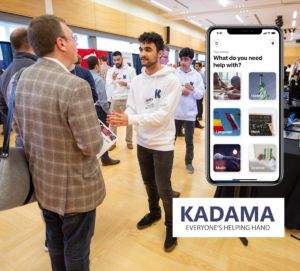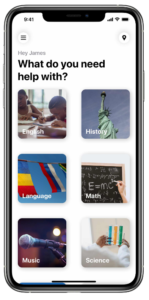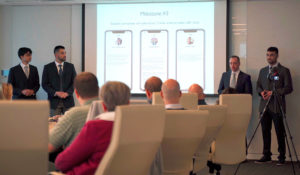Student Startup Spotlight: Kadama Offers a Helping Hand
 Being able to trace your startup development year-to-year alongside your progress through school is a rare feat. Then again, the team behind the student startup Kadama is anything but ordinary. Kadama graduated in February from the Jones + Foster Accelerator, hosted by the UW Foster School’s Buerk Center for Entrepreneurship, with an app that connects the community with tutoring on two levels; Those who need a tutor can search based on subjects and find an expert match. Those who want to tutor can build a profile and manage earnings.
Being able to trace your startup development year-to-year alongside your progress through school is a rare feat. Then again, the team behind the student startup Kadama is anything but ordinary. Kadama graduated in February from the Jones + Foster Accelerator, hosted by the UW Foster School’s Buerk Center for Entrepreneurship, with an app that connects the community with tutoring on two levels; Those who need a tutor can search based on subjects and find an expert match. Those who want to tutor can build a profile and manage earnings.
The service-based spin on gig economy models like Lyft officially launched in November of 2019. Founders Amin Shaykho and Marwan El-Rukby began working on it four years ago—the summer before Amin started at the University of Washington and a year before Marwan started at UW. The third founder, Amin’s younger brother Dani Shaykho, shared the journey as he made his way through high school. (He will attend UW in the fall of 2020)
Now they have a growing business on their hands and early success they can build on.
The three founders spoke with the Buerk Center about their journey, the lessons that have stuck with them, and what ultimately allowed their startup to go from idea to launch.
Q: How did the conversation start around developing this idea?
Amin: It was the summer of 2016, a few weeks before we decided to make it a business. I was in my house and I wanted to request someone to come clean our kitchen because my mom told me and my brother Dani that we can’t leave until the kitchen is clean, and we wanted to leave immediately. So, we thought there must be an app where we can request something like that. I searched and found that the average cost for a 25-minute job was up $70-to-$80 and it freaked me out. The next morning, I was thinking to myself what if there was an easy way to request a simple task, with good quality, at an affordable rate. We did a lot of research and it turns out most of these apps are focused on professional services which lure you into paying very high prices. We knew we could expand the market to basically anyone who wants a job.
Marwan and I met up a few weeks later in Bellevue where we were both doing summer internships. We hadn’t talked in a long time. We knew each other through XBOX Live online playing games. We realized we were both interested in business and technology. We bounced some ideas off each other and the idea that would become Kadama came up and we both immediately knew there was a huge potential in that market. We then came up with what to name it and threw out a few words and landed on a word that is a spinoff of the Arabic word that means service.
That’s how it became Kadama: Everyone’s helping hand.
Q: In Fall of 2016, where was everyone at in terms of schooling?
Amin: I had just graduated high school and was starting at University of Washington in the fall.
Marwan: I was in my last year of high school, but I was doing the running start program at Bellevue College.
Dani: I just began my freshman year in High School.
Q: Were you aware of the gig economy that has taken on a new life the last few years?
Marwan: The gig economy has been growing rapidly the past decade. The biggest examples of that are companies like Uber and Lyft. We didn’t know until we searched that there was something like that for services. We were surprised to discover there were. We’ve conducted surveys and most of our respondents didn’t know that an app like this for handyman, an app for yard work, for tutoring, existed. The gig economy was growing rapidly, but for services, the market was untapped. It was an opportunity to come in and prove that we are better than our competitors.
 Q: How has Kadama evolved as you’ve progress through schooling?
Q: How has Kadama evolved as you’ve progress through schooling?
Amin: The period of developing the app was from 2016 to 2018. In 2018, we were testing it and trying to get it out. The fact that we were 18 or under when we came up with the idea, we barely had any resources. We didn’t know how to create an app. We didn’t know what to do for the first few months after coming up with the idea. But we were eager to create it. So, we looked at every connection we had. A mentor knew a group of people who could help us create the product.
For the first year, there were so many failures. We had no prior true leadership or product development understanding, deadlines were never being met, designs didn’t look the way we wanted. But the thing is, Marwan, Dani, and I are fast learners and we did research to see what other companies were doing to become successful. We’ve had three different designs for our app and there’s a blog we have up that shows that.
Q: What were the benefits of being a student during that development phase?
Amin: The summer of 2017, with pressure increasing, I was able to find a balance between schoolwork and the app. I think always having in mind that I was a student and I had a backup in case anything went wrong, helped me overcome any challenges. Seeing the traction of where Kadama is heading has inspired us to work even harder.
Marwan: When I got accepted into the Foster School of Business, it started to get tough and I really felt the pressure. Classes were harder, more rigorous, and time-consuming. Once I got adjusted and acclimated, I was able to handle it. Once we launched the official beta in 2018, that was also a difficult period to manage. But over time, I’ve adjusted.
Dani: Kadama helped my organization skills and priorities tremendously as a High School student. During the development, I had to find time to work on it. It taught me that I have to sacrifice things to work on it. I struggled for a couple of years, but now I’ve learned to balance my time wisely. (Dani was accepted into the University of Washington and will be attending Fall 2020).
Q: How did the Dempsey Startup Competition experience in 2019 impact your team?
Marwan: We hadn’t interacted with a lot of other startups at that point. Being in that room with so many other amazing things really opened our eyes. What we learned the most was how to properly convey how we felt about our app and why it was better than our competitors. We learned how to speak to investors, how to speak to judges, people who have seen apps like this before. We learned we weren’t in just our own little bubble. We were used to pitching to people on the street who had no idea an app like this existed. Many of the judges did.
Amin: The whole thing was a learning experience. When we were talking to the judges, it helped us truly understand as well why we were unique. We heard them say why we were like others and that helped us break down the value we were offering. Those lessons later helped us with the Jones + Foster Accelerator.
Dani: It really opened my mind to new concepts and as a result, I was able to develop because of that and see new perspectives.

Kadama graduated from the Jones + Foster Accelerator in February after hitting six months of milestones
Q: You graduated from the Jones + Foster Accelerate in February of 2020. Looking back at that 6-month process, what are your big takeaways?
Amin: By being receptive to our mentors’ feedback, not only did I grow as an entrepreneur and leader, but we made an instrumental pivot in our business that led to a huge growth in revenue. The Jones + Foster Accelerator took Kadama from a beta period to a transition phase where we now focus on one service—tutoring.
Marwan: With guidance from our JFA mentors, I learned that for Kadama to grow, we need to quickly be thinking and executing as many strategies as possible and that there is always more work that can be done.
Dani: The Accelerator fostered my yearning to learn and innovate. It has left me with a burning desire to to continue to peruse excellence—ultimately allowing me to impact the community in the best possible way.
Q: Do you hope your journey as student entrepreneurs will be inspiring to other students?
Marwan: When we talked at the startup showcase, I mentioned how weird it was to talk to other students about the process. One interaction I had specifically, this person was really excited about making his own startup. He realized at this stage he could come up with any idea and as a student, anything was possible.
Amin: When we first officially launched the app in 2018, lots of people around us started asking questions. In fact, one person who didn’t have a startup yet, would talk to us all the time about our journey—and now he has his own he’s working on. He would do his own reading and follow up with Marwan and me, and ask how did you build your database, how did you become an LLC, how did you get a trademark?
It was also cool that in summer of 2018 we were able to run our own paid internship program (small stipends) for Kadama after launching our beta. We used social media to put out there that we needed help. We got 20 to 30 resumes and accepted seven or eight young students interested in entrepreneurship. We explained to them the vision and together we were able to create a lot of great things for our app and our community. They would say “whoa, this is so cool that I was able to come create something for you guys.”
We strive to be able to take this to greater levels and inspire even more people.
